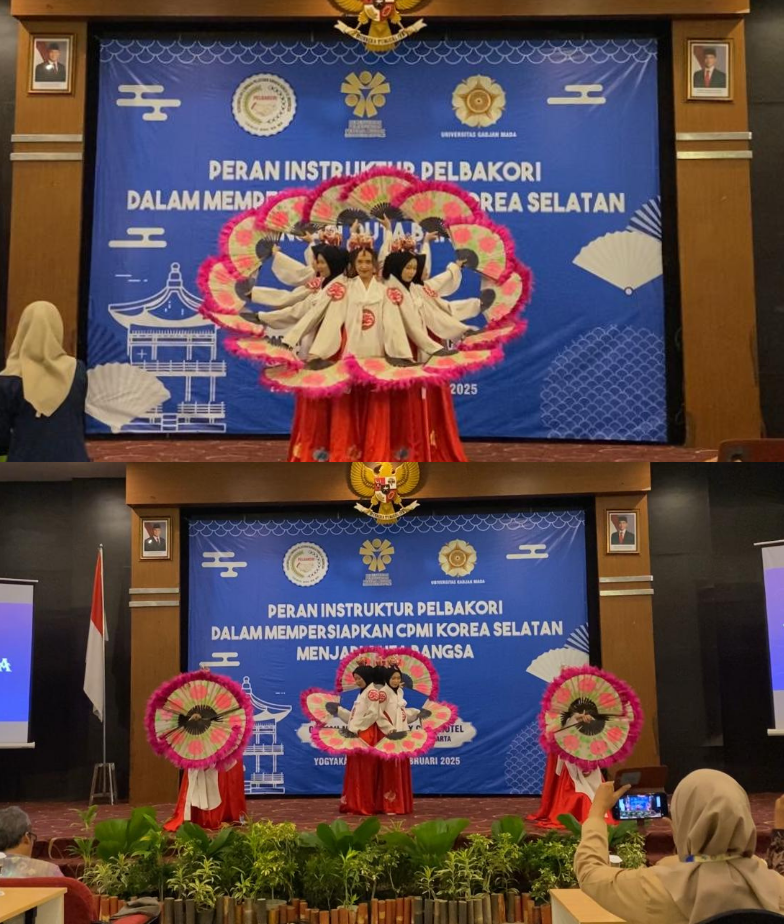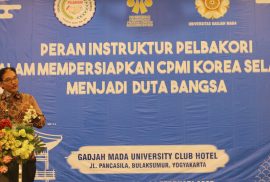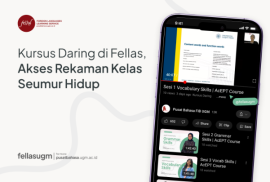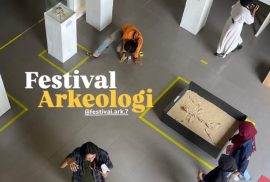Yogyakarta, 23/2/2025 – University Club Boulevard hosted a seminar and workshop aimed at improving the role of PELBAKORI instructors in preparing prospective Indonesian migrant workers to work in South Korea. Welcomed by the dean of the Faculty of Humanities, Prof. Dr. Setiadi, S.Sos., M.Si., the event was a follow-up to an audience held in January 2025 between the Ministry of Protection of Indonesian Migrant Workers (KP2MI) and PELBAKORI, which focused on the government-to-government (G to G) labour dispatch programme.

Seminar dimulai dengan upacara pembukaan yang mencakup lagu kebangsaan Indonesia, diikuti dengan pembacaan doa. Suasana penuh semangat saat para undangan disuguhkan penampilan tari kipas Korea (Buchaechum) yang dibawakan oleh para mahasiswi dari Program Studi Bahasa dan Kebudayaan Korea. Pertunjukan yang memukau ini tidak hanya menunjukkan keindahan budaya Korea, tetapi juga menciptakan suasana positif untuk kegiatan hari itu.


One of the crucial issues identified in this programme is the language barrier faced by Indonesian migrant workers, which is a concern for Korean employers. Many workers have difficulty understanding work instructions, resulting in miscommunication and potential conflict. To address this, PELBAKORI is committed to improving the quality and skills of prospective migrant workers, especially in language acquisition, by collaborating with academic institutions.
Instructors from vocational training centres (LPK) that are members of PELBAKORI play an important role in this initiative. They are tasked with equipping migrant workers with the language skills necessary to succeed in South Korea. Therefore, it is imperative that these instructors continue to improve their teaching skills in Korean.
The Korean Language and Culture Study Programme at Universitas Gadjah Mada (UGM) has been a key partner of PELBAKORI since 2018. This collaboration aims to create synergy between academia, vocational training institutions, and KP2MI to improve the quality of prospective migrant workers. The ultimate goal is to prepare these workers to become ambassadors of the nation who contribute to the country’s foreign exchange earnings, in accordance with KP2MI’s tagline #BerangkatMigranPulangJuragan.
The seminar was attended by distinguished guests, including Dwi Setiawan Susanto, Director General of Promotion and Utilisation of Overseas Employment Opportunities at KP2MI, and Abri Danar Prabawa, Director of Vocational Institutional Development for Indonesian Migrant Workers at KP2MI. Also present will be the heads of UPT BP3MI from Yogyakarta, Central Java, and East Java, as well as Shin Jiwon from the Centre for Southeast Asian Studies at Hankuk University of Foreign Studies (HUFS).
The event will also feature expert speakers, including Suray Agung Nugroho, S.S., MA, Ph.D. from the department of Korean Language and Culture, Faculty of Cultural Sciences, Universitas Gadjah Mada, Didin Samsudin, S.E., M.M., CHCM., CIT. from Universitas Pendidikan Indonesia, and Dr Hwang Who Young, M.A. from Universitas Gadjah Mada. Their insights will be invaluable in discussing challenges and solutions related to language training for migrant workers.
As part of the workshop, participants will engage in interactive sessions designed to improve their teaching methodologies and language teaching techniques. This practical approach aims to empower instructors to better prepare their students for the realities of working in South Korea, ensuring they can communicate and integrate well in the workplace.
This seminar and workshop is a significant step towards achieving the Sustainable Development Goals (SDGs), especially in terms of access to education and decent work for all. By investing in the education and training of migrant workers, Indonesia not only improves their competitiveness but also fosters a more skilled workforce that can contribute positively to the economy.
In conclusion, collaboration between PELBAKORI, KP2MI, and academic institutions is crucial to the success of Indonesian migrant workers in South Korea. By overcoming the language barrier and improving the quality of training, this initiative will help create a generation of skilled workers who can be ambassadors for Indonesia abroad.
[Public Relations Faculty of Cultural Sciences UGM, Bulan Churniati]







